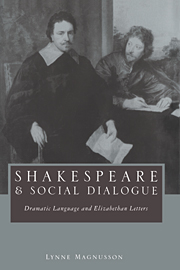Book contents
- Frontmatter
- Contents
- Acknowledgments
- Introduction
- Part 1 THE RHETORIC OF POLITENESS
- Chapter 1 Politeness and dramatic character in Henry VIII
- Chapter 2 “Power to hurt”: language and service in Sidney household letters and Shakespeare's sonnets
- Part II ELOQUENT RELATIONS IN LETTERS
- Part III A PROSAICS OF CONVERSATION
- Notes
- Bibliography
- Index
Chapter 2 - “Power to hurt”: language and service in Sidney household letters and Shakespeare's sonnets
Published online by Cambridge University Press: 22 September 2009
- Frontmatter
- Contents
- Acknowledgments
- Introduction
- Part 1 THE RHETORIC OF POLITENESS
- Chapter 1 Politeness and dramatic character in Henry VIII
- Chapter 2 “Power to hurt”: language and service in Sidney household letters and Shakespeare's sonnets
- Part II ELOQUENT RELATIONS IN LETTERS
- Part III A PROSAICS OF CONVERSATION
- Notes
- Bibliography
- Index
Summary
“Power to hurt”: my starting point is a phrase shared by Edmund Molyneux and William Shakespeare. In an eloquent and rhetorically complicated letter to Sir Philip Sidney, answering a rebuke from him, his father's secretary, Edmund Molyneux writes of having “neither Will nor Power to hurt in this Case if I wolde.”
Letter 1
Edmund Molyneux, Esq; to Sir Philip Sidney.
SIR,
I have receaved your Lettres, and doe acknowledge the same as a speciall Note of your lovinge Favour, that it wold please you to write vnto me; and what may lye in me in any Sorte to doe, you shall not need to requier me: But you have (yf it may soe lyke you) full Power and good Warrant to commaund me. Sir, yt semethe by your said Lettres, that you have beene enformed, that I either have already, or in some Sorte pretend hereafter, to be an Adversarie to Mr. Grivell in his Sute heere; and that I make not that good Accounte of the Validitie and Goodnes of his Patent, as in Reasone and cowrtewse frindlie Dealinge, I should doe, somwhat, as you gather, to his Disadvantage, beinge a Matter, as you saye, of noe Bennefite to my selfe; which, yf I showld soe forgett my selfe (yf it were only in Respect that you esteeme Mr. Gryvell as your deere and entier Frend) I showld justlie condemne my selfe of vnadvised and twoe great inconsiderat Dealinge.
- Type
- Chapter
- Information
- Shakespeare and Social DialogueDramatic Language and Elizabethan Letters, pp. 35 - 58Publisher: Cambridge University PressPrint publication year: 1999



